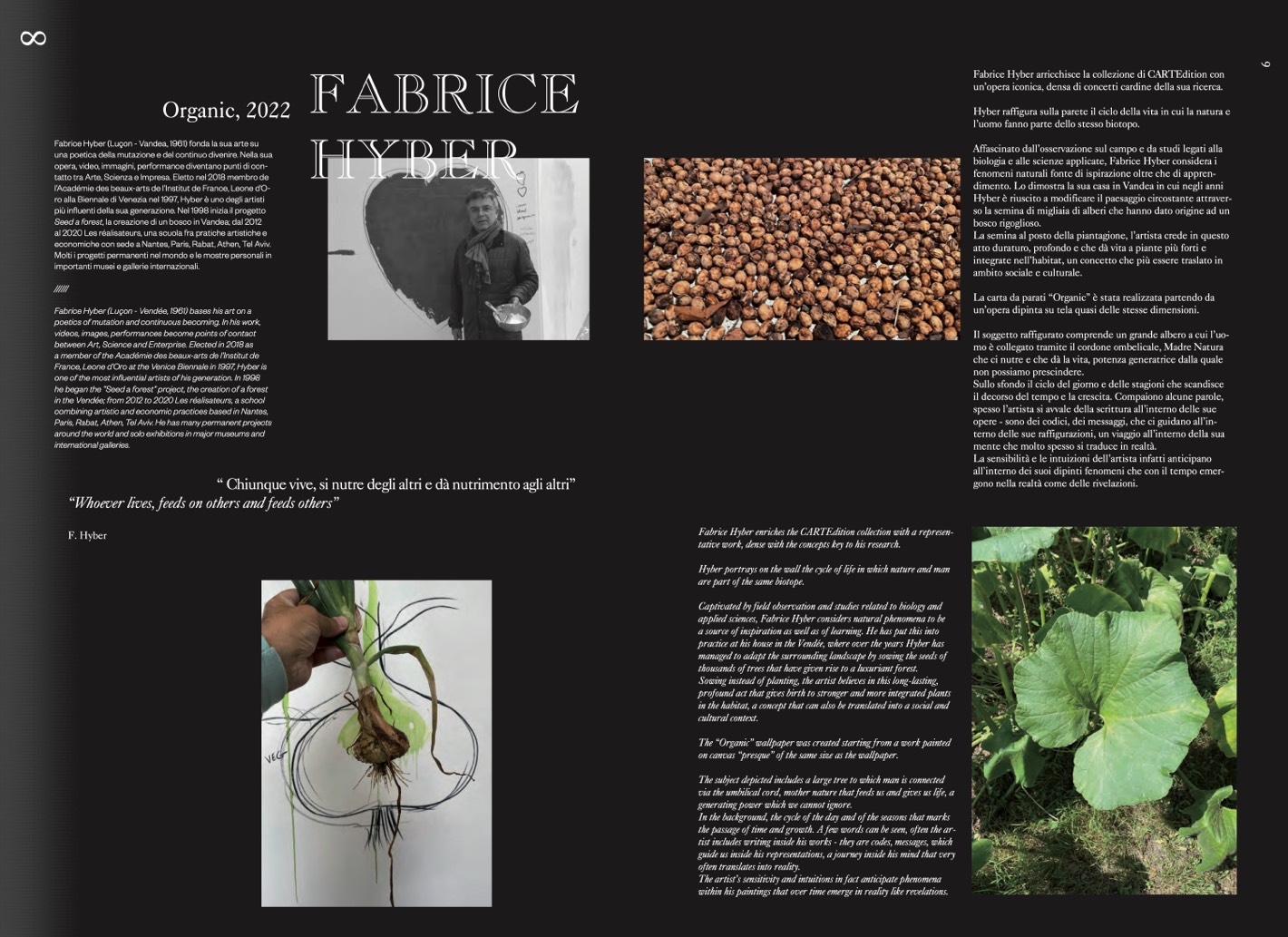
Organic, 2022
FABRICE
HYBER
Fabrice Hyber arricchisce la collezione di CARTEdition con
un’opera iconica, densa di concetti cardine della sua ricerca.
Hyber raffigura sulla parete il ciclo della vita in cui la natura e
l’uomo fanno parte dello stesso biotopo.
Affascinato dall’osservazione sul campo e da studi legati alla
biologia e alle scienze applicate, Fabrice Hyber considera i
fenomeni naturali fonte di ispirazione oltre che di appren-
dimento. Lo dimostra la sua casa in Vandea in cui negli anni
Hyber è riuscito a modificare il paesaggio circostante attraver-
so la semina di migliaia di alberi che hanno dato origine ad un
bosco rigoglioso.
La semina al posto della piantagione, l’artista crede in questo
atto duraturo, profondo e che dà vita a piante più forti e
integrate nell’habitat, un concetto che più essere traslato in
ambito sociale e culturale.
La carta da parati “Organic” è stata realizzata partendo da
un’opera dipinta su tela quasi delle stesse dimensioni.
Il soggetto raffigurato comprende un grande albero a cui l’uo-
mo è collegato tramite il cordone ombelicale, Madre Natura
che ci nutre e che dà la vita, potenza generatrice dalla quale
non possiamo prescindere.
Sullo sfondo il ciclo del giorno e delle stagioni che scandisce
il decorso del tempo e la crescita. Compaiono alcune parole,
spesso l’artista si avvale della scrittura all’interno delle sue
opere - sono dei codici, dei messaggi, che ci guidano all’in-
terno delle sue raffigurazioni, un viaggio all’interno della sua
mente che molto spesso si traduce in realtà.
La sensibilità e le intuizioni dell’artista infatti anticipano
all’interno dei suoi dipinti fenomeni che con il tempo emer-
gono nella realtà come delle rivelazioni.
Fabrice Hyber (Luçon - Vandea, 1961) fonda la sua arte su
una poetica della mutazione e del continuo divenire. Nella sua
opera, video, immagini, performance diventano punti di con-
tatto tra Arte, Scienza e Impresa. Eletto nel 2018 membro de
l’Académie des beaux-arts de l’Institut de France, Leone d’O-
ro alla Biennale di Venezia nel 1997, Hyber è uno degli artisti
più influenti della sua generazione. Nel 1998 inizia il progetto
Seed a forest, la creazione di un bosco in Vandea; dal 2012
al 2020 Les réalisateurs, una scuola fra pratiche artistiche e
economiche con sede a Nantes, Paris, Rabat, Athen, Tel Aviv.
Molti i progetti permanenti nel mondo e le mostre personali in
importanti musei e gallerie internazionali.
//////
Fabrice Hyber (Luçon - Vendée, 1961) bases his art on a
poetics of mutation and continuous becoming. In his work,
videos, images, performances become points of contact
between Art, Science and Enterprise. Elected in 2018 as
a member of the Académie des beaux-arts de l’Institut de
France, Leone d’Oro at the Venice Biennale in 1997, Hyber is
one of the most influential artists of his generation. In 1998
he began the “Seed a forest” project, the creation of a forest
in the Vendée; from 2012 to 2020 Les réalisateurs, a school
combining artistic and economic practices based in Nantes,
Paris, Rabat, Athen, Tel Aviv. He has many permanent projects
around the world and solo exhibitions in major museums and
international galleries.
“ Chiunque vive, si nutre degli altri e dà nutrimento agli altri”
“Whoever lives, feeds on others and feeds others”
F. Hyber
Fabrice Hyber enriches the CARTEdition collection with a represen-
tative work, dense with the concepts key to his research.
Hyber portrays on the wall the cycle of life in which nature and man
are part of the same biotope.
Captivated by field observation and studies related to biology and
applied sciences, Fabrice Hyber considers natural phenomena to be
a source of inspiration as well as of learning. He has put this into
practice at his house in the Vendée, where over the years Hyber has
managed to adapt the surrounding landscape by sowing the seeds of
thousands of trees that have given rise to a luxuriant forest.
Sowing instead of planting, the artist believes in this long-lasting,
profound act that gives birth to stronger and more integrated plants
in the habitat, a concept that can also be translated into a social and
cultural context.
The “Organic” wallpaper was created starting from a work painted
on canvas “presque” of the same size as the wallpaper.
The subject depicted includes a large tree to which man is connected
via the umbilical cord, mother nature that feeds us and gives us life, a
generating power which we cannot ignore.
In the background, the cycle of the day and of the seasons that marks
the passage of time and growth. A few words can be seen, often the ar-
tist includes writing inside his works - they are codes, messages, which
guide us inside his representations, a journey inside his mind that very
often translates into reality.
The artist’s sensitivity and intuitions in fact anticipate phenomena
within his paintings that over time emerge in reality like revelations.
8
9

